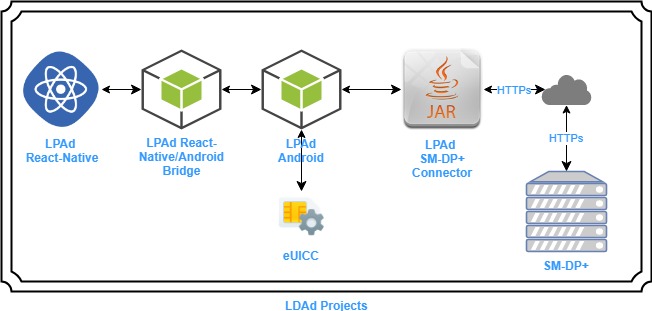This project offers an implementation of the SGP22 Local Profile Assistant for Device (LPAd).
Allows communication with the SM-DP+ and implements the needed logic of ES9+ (LPA -- SMDP+) interface. It is also implemented all the logic for ES10x (LPA -- eUICC) interface. It is implemented in Java.
The current project is only one part of several other Truphone’s* projects that implement LPAd totally. The following diagram gives an overview of currently existing projects that relate to Truphone*’s* LPAd *implementation:
High level explanation of the several Truphone’s LPAd projects:
-
LPAd React-Native - UI for List Profiles, Download a Profile and Enable/Disable/Delete a Profile. It is implemented in React-Native.
-
LPAd React-Native/Android Bridge - Allows React-Native sub-project code to communicate with LPAd Android sub-project code. This implementation is specific for React-Native and Android/Java.
-
LPAd Android - Allows communication (through Android TelephonyManager) with the installed eUICC on the Device. It is also the Proxy to LPAd RSP Connector sub-project. Implemented in Android/Java
-
LPAd SM-DP+ Connector - This project. Allows communication with the SM-DP+ and implements the needed logic of ES9+ (LPA -- SMDP+) interface. It is also implemented all the logic for ES10x (LPA -- eUICC) interface. It is implemented in Java.
The following diagram depicts the project high level architecture:
Maven coordinates to import this lib into your project:
- Gradle
com.truphone.lpad:lpad-sm-dp-plus-connector:1.0.4- Maven
<dependency>
<groupId>com.truphone.lpad</groupId>
<artifactId>lpad-sm-dp-plus-connector</artifactId>
<version>1.0.4</version>
</dependency>
To start using this lib in your code, you'll only need to write the following lines:
- Get EID
// Your ApduChannelImpl implementation
ApduChannelImpl apduChannel = new ApduChannelImpl(getApplicationContext());
LocalProfileAssistantImpl localProfileAssistant = new LocalProfileAssistantImpl(apduChannel, "<your-rsp-server-url>");
String eid = localProfileAssistant.getEID();- Allocate Profile
// Your ApduChannelImpl implementation
ApduChannelImpl apduChannel = new ApduChannelImpl(getApplicationContext());
LocalProfileAssistantImpl localProfileAssistant = new LocalProfileAssistantImpl(apduChannel, "<your-rsp-server-url>");
String acToken = localProfileAssistant.allocateProfile("268");This component implements the APDU Channel interface which can be used to create E2E tests dynamically without depending on a specific APDU Channel implementation.
Maven coordinates to import this lib into your project:
- Gradle
com.truphone.lpad:apdu-channel-simulator:1.0.4- Maven
<dependency>
<groupId>com.truphone.lpad</groupId>
<artifactId>apdu-channel-simulator</artifactId>
<version>1.0.4</version>
</dependency>
The modo-operandis is first of all define the expectation result for the operation you want to invoke, and then perform the invocation.
Examples:
- TransmitAPDU
// initialization
LpadApduChannelSimulator lpadApduChannelSimulator = new LpadApduChannelSimulator(new MapPersistence(new HashMap()));
// first you need to define the expectation
lpadApduChannelSimulator.setTransmitAPDUExpectation("APDU_SUCCESS", "asdsdasd23123easd");
// then invoke the 'TransmitAPDU' operation which will return the value defined on the expectation
assertEquals("asdsdasd23123easd", lpadApduChannelSimulator.transmitAPDU("APDU_SUCCESS"));
